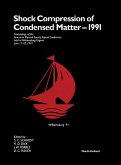Volume 1, Gauge Theory and Defects in Solids, presents a detailed development of a rational theory of the dynamics of defects and damage in solids. Solutions to field equations are used to determine stresses, dislocation densities and currents that arise from histories of loading of boundaries of bodies. Analysed in detail is a gauge theory with a gauge group that is not semi-simple, and whose action occurs at the classical macroscopic level. Yang-Mills theory is applied where the state variables are elastic displacements in solids, determination of mechanical and electromagnetic observables by choice of gauge conditions is demonstrated, and practices of classical dislocation theory are derived from first principles.
Dieser Download kann aus rechtlichen Gründen nur mit Rechnungsadresse in A, B, BG, CY, CZ, D, DK, EW, E, FIN, F, GR, HR, H, IRL, I, LT, L, LR, M, NL, PL, P, R, S, SLO, SK ausgeliefert werden.









